 Petzlover
Petzlover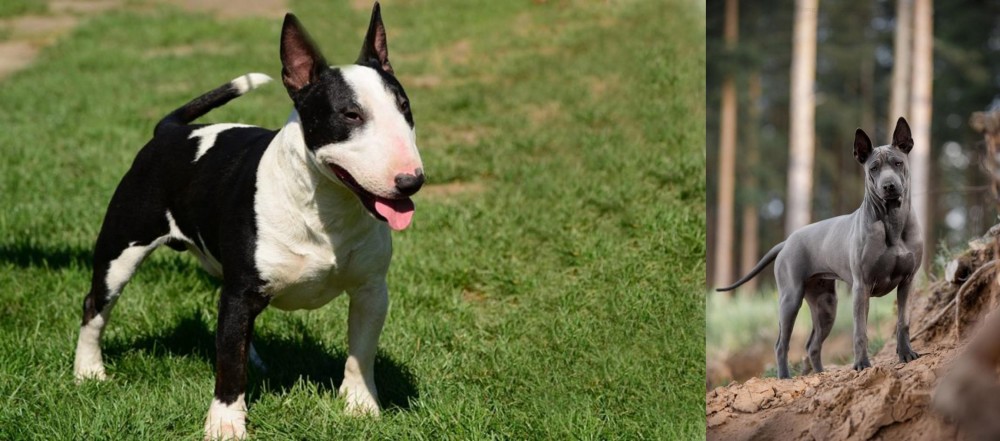 Bull Terrier Miniature is originated from United Kingdom but Thai Ridgeback is originated from Thailand. Bull Terrier Miniature may grow 28 cm / 11 inches shorter than Thai Ridgeback. Bull Terrier Miniature may weigh 19 kg / 41 pounds lesser than Thai Ridgeback. Both Bull Terrier Miniature and Thai Ridgeback has almost same life span. Bull Terrier Miniature may have more litter size than Thai Ridgeback. Bull Terrier Miniature requires Low Maintenance. But Thai Ridgeback requires Moderate Maintenance
Bull Terrier Miniature is originated from United Kingdom but Thai Ridgeback is originated from Thailand. Bull Terrier Miniature may grow 28 cm / 11 inches shorter than Thai Ridgeback. Bull Terrier Miniature may weigh 19 kg / 41 pounds lesser than Thai Ridgeback. Both Bull Terrier Miniature and Thai Ridgeback has almost same life span. Bull Terrier Miniature may have more litter size than Thai Ridgeback. Bull Terrier Miniature requires Low Maintenance. But Thai Ridgeback requires Moderate Maintenance
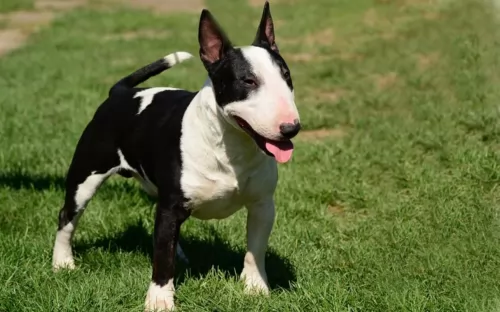 Less well known than the Bull Terrier, the Miniature Bull Terrier which actually follows the same breed standard, has a height of 35cm. The Bull Terrier and Miniature are classified as the same breed. The weight of the smaller Miniature is only about 15kg.
Less well known than the Bull Terrier, the Miniature Bull Terrier which actually follows the same breed standard, has a height of 35cm. The Bull Terrier and Miniature are classified as the same breed. The weight of the smaller Miniature is only about 15kg.
It was in the early 1800s that the Miniature Bull Terrier was developed, descending from the English Bulldog as well as the White English Terrier which is now extinct. This blend produced the Bull and Terrier, which was later shortened to the Bull Terrier. They came in a number of colors such as pure white, white and tan as well as white-and-black-patched or tri-colored.
Breed fanciers wanted a compact dog which looked much the same as the larger Bull Terrier. It was in 1938 that Colonel Glyn founded the Miniature Bull Terrier Club in England and the Miniature Bull Terrier Club of America was formed in 1966.
 Until recently the Thai Ridgeback was not known outside of its native land. However, after being recently recognized as a standard breed, the dogs are getting some notice from the western world. They are one of three known ridgeback breeds with the ridge running the opposite direction of the rest of her fur. The other breeds with this characteristic are the better known Rhodesian Ridgeback and the even lesser known Phu Quoc Ridgeback.
Until recently the Thai Ridgeback was not known outside of its native land. However, after being recently recognized as a standard breed, the dogs are getting some notice from the western world. They are one of three known ridgeback breeds with the ridge running the opposite direction of the rest of her fur. The other breeds with this characteristic are the better known Rhodesian Ridgeback and the even lesser known Phu Quoc Ridgeback.
The Thai Ridgeback is believed to have originated in eastern Thailand but there is no documentation of their actual history. The breed is thought to be descended from the Funan Ridgeback based on a genetic hypothesis. It is thought that the same Funan Ridgeback is an ancestor od the Phu Quoc Dog. This Funan Ridgeback lived over a century ago. Along with the Rhodesian Ridgeback, all have a common ridgebearing ancestor.
It is still unknown where the original ridge came from but it has been shown that all of the ridgeback dogs have the same genetic mutation and even though the Rhodisian is from Africa, there is not a parallel mutation. The Thai Ridgeback is an active, energetic, tough dog. He is loyal, intelligent, and has great jumping ability.
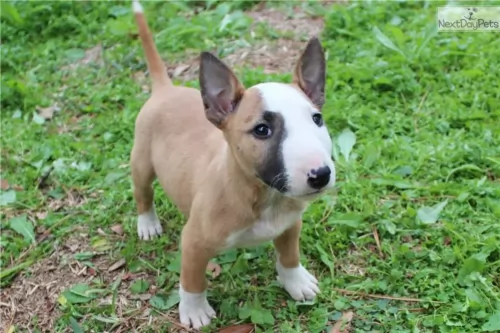 Miniature Bull Terriers, just like the regular Bull Terriers have short, glossy coats and these coats can be white, tan, brindle or tri-color such as black, tan and white. This is a muscular little dog, with the same very distinctive egg-shaped head and small, closely-set dark eyes and erect ears. The medium length tail is carried horizontally.
Miniature Bull Terriers, just like the regular Bull Terriers have short, glossy coats and these coats can be white, tan, brindle or tri-color such as black, tan and white. This is a muscular little dog, with the same very distinctive egg-shaped head and small, closely-set dark eyes and erect ears. The medium length tail is carried horizontally.
The Miniature Bull Terrier isn’t particularly good with small children, but he still makes a good companion for people, whether he lives in the city or the country. In fact, this smaller breed Bull Terrier makes a great pet for people with smaller spaces, and like the Bull Terrier, he is a loving, devoted pet. He has an entertaining personality, is playful and energetic, making him a good watch dog.
However, even though he is small, he is always more than ready to take on any larger pets and therefore isn’t considered the greatest pet to have if you have other animals in the house. However, with excellent training and socialization, this handicap can be overcome.
 The breed is medium in size and muscular in body. They have a wedge shaped head, a short coat that is smooth and pricked, triangular ears. The ridge on his back is pronounced as the hair grows away from the rest of the coat from the hips to the withers. Puppies can be born with or without the ridge. They are extremely agile. With what is often called a sword tail being carried up, the Ridgeback has wrinkles on his forehead, a black tongue or the tongue has black marks, and almond shaped eyes.
The breed is medium in size and muscular in body. They have a wedge shaped head, a short coat that is smooth and pricked, triangular ears. The ridge on his back is pronounced as the hair grows away from the rest of the coat from the hips to the withers. Puppies can be born with or without the ridge. They are extremely agile. With what is often called a sword tail being carried up, the Ridgeback has wrinkles on his forehead, a black tongue or the tongue has black marks, and almond shaped eyes.
The coat sheds minimally and is dense, while the eyes are usually brown – in blue dogs they can be amber. The color of the coat is fawn, red, black or blue with a black mask on the reds. There are 8 different ridge patterns: Feather, violin, saddleback, needle, arrow, bowling pin, lute, and leaf. The broader the ridge the better the dog is considered for show.
There are two epistatic genes that determine the ridge and its size. The more genes of this type the individual dog has, the broader the ridge will be. There must be a dominant gene for the ridge to appear at all.
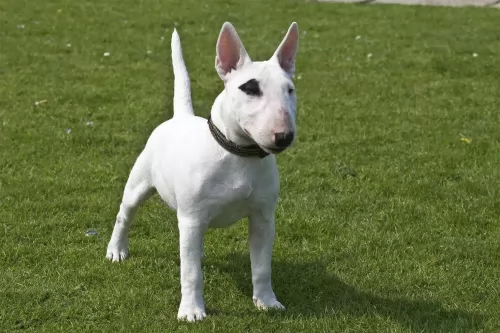 The attractive Miniature Bull Terrier is just a small version of the regular Bull Terrier, and many people are drawn to them because they have all the spunk of the larger breed but are easier to manage. He is such an entertaining little dog and guarantees to make an excellent family companion. He is just longing to be involved in every family activity happening around him.
The attractive Miniature Bull Terrier is just a small version of the regular Bull Terrier, and many people are drawn to them because they have all the spunk of the larger breed but are easier to manage. He is such an entertaining little dog and guarantees to make an excellent family companion. He is just longing to be involved in every family activity happening around him.
He becomes attached to his human family, but this deep bond between him and his family can lead to separation anxiety. Never leave him alone day after day in the backyard. You wouldn’t to that to one of your children, and he is a family member, albeit a 4-legged one.
Just like the standard Bull Terrier, the Miniature Bull Terrier is going to need firm training from a young age. Then he becomes an exceptional pet as he understand the boundaries in your particular home.
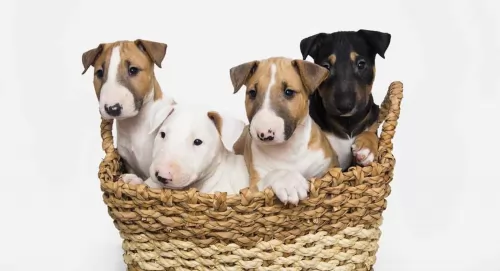 The Miniature Bull Terrier can live to be 10 to 12 years of age. Their most serious health issue is blindness which is caused by lens dislocation, showing up more or less after 3 years of age. With the white dogs, other breed health concerns can include congenital deafness and compulsive tail chasing.
The Miniature Bull Terrier can live to be 10 to 12 years of age. Their most serious health issue is blindness which is caused by lens dislocation, showing up more or less after 3 years of age. With the white dogs, other breed health concerns can include congenital deafness and compulsive tail chasing.
Some Bull Terriers develop a compulsive neurologic disorder where the dog turns round and round chasing his tail. As soon as you see this, try and distract him with an exciting game, because allowed to develop, it’s a habit that can become difficult to control.
This is a common problem with dogs and you need to watch that tartar build-up on the teeth which can lead to infection of the gums. Brush your pet’s teeth with special dog toothpaste and toothbrush 2 or 3 times a week so that he doesn’t lose any teeth. Bad teeth can affect other organs such as the kidneys and heart.
 With such a mysterious origin, there are not a lot of documented episodes of genetic illness as the breed has been isolated in Thailand and natural selection has driven reproduction. There are only a few issues that they are genetically predisposed to. These include:
With such a mysterious origin, there are not a lot of documented episodes of genetic illness as the breed has been isolated in Thailand and natural selection has driven reproduction. There are only a few issues that they are genetically predisposed to. These include:
• Dermoid Sinus – this is a genetic skin condition known as pilonidal sinus as well. This is a defect in the neural tube and the sinus might be removed. If the sinus is wrapped around the spinal cord and cannot be removed it can be tied off.
• Bloat – can be terminal if not treated as soon as possible. Bloat is a distension of the stomach and intestines which can twist and tangle, killing the dog almost immediately without veterinary attention.
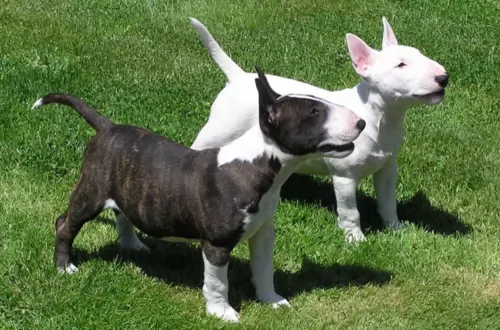 With his short, smooth coat, the Miniature Bull Terriers requires little grooming. He’ll need a good brush down twice a week to remove loose hairs.
With his short, smooth coat, the Miniature Bull Terriers requires little grooming. He’ll need a good brush down twice a week to remove loose hairs.
This is one of the best things you can do for your Bull Terrier if you don’t want them having puppies. Spaying or neutering decreases the likelihood of certain types of cancers too.
Keep your dog’s diet consistent, varying between a top quality commercial produced dog food appropriate to his age. You can include home-made meat, vegetables and rice and some raw meat every now and then. Never feed him human-food such as peanuts, crisps and chocolate. Always have fresh, cool water available night and day.
 1. Feeding the Puppy - Don’t over feed the puppy as they are inclined to become obese. Feed a high quality protein rich puppy for medium breeds. Feed in 3-4 smaller meals per day. As he grows be aware of bloat possibilities.
1. Feeding the Puppy - Don’t over feed the puppy as they are inclined to become obese. Feed a high quality protein rich puppy for medium breeds. Feed in 3-4 smaller meals per day. As he grows be aware of bloat possibilities.
2. Feeding the adult dog - The risk of bloat is even greater in the adult and so is the risk of obesity. Don’t feed large meals and don’t feed before or after strenuous exercise. Feed in 2 smaller meals per day.
4. Games and Exercises – Energetic and needs serious exercise. She loves to swim, retrieve, hike, hunt, and catch frisbees. Likes search and rescue and guard dog work.